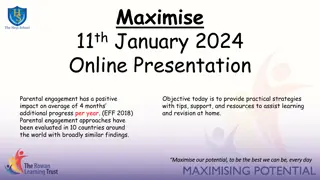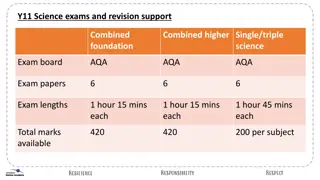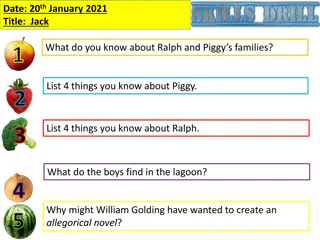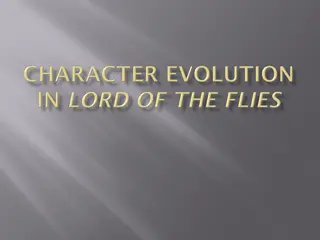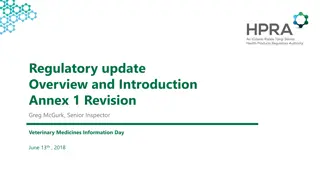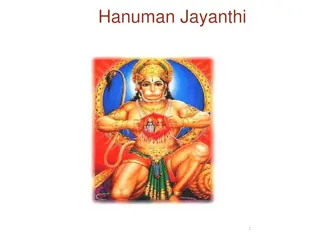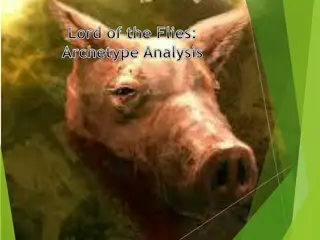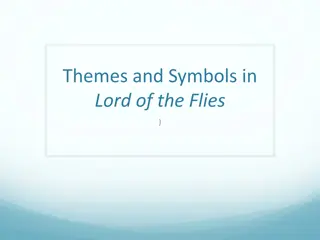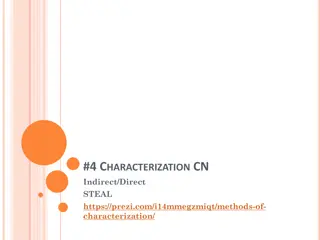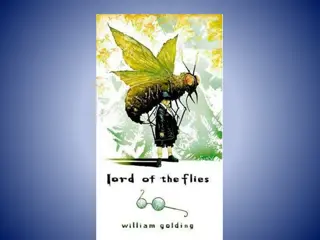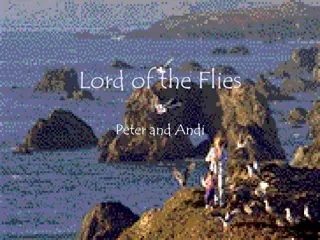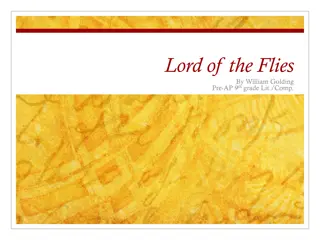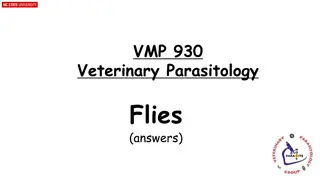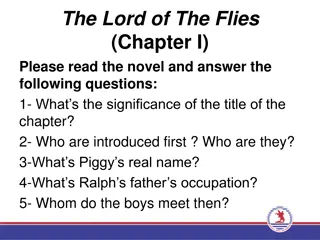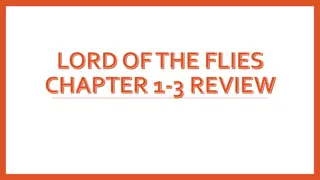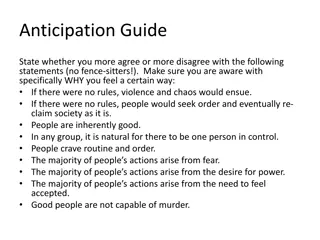Exploring Themes and Context in "Lord of the Flies" Revision
This revision guide delves into the themes, characters, symbolism, and context of William Golding's "Lord of the Flies." It explores the interplay of leadership, democracy, good vs. evil, civilization, and savagery within the novel's historical and political background. Through analyzing the characters' physical appearance, behavior, and relationships, as well as significant events, readers gain insights into Golding's message about society and human nature. The guide also examines the allegorical nature of the novel's symbols and settings, such as the conch, the beast, and the island, shedding light on the deeper meanings behind the story.
Download Presentation

Please find below an Image/Link to download the presentation.
The content on the website is provided AS IS for your information and personal use only. It may not be sold, licensed, or shared on other websites without obtaining consent from the author. Download presentation by click this link. If you encounter any issues during the download, it is possible that the publisher has removed the file from their server.
E N D
Presentation Transcript
Lord of the Flies Revision
Revision THEMES CHARACTERS Their physical appearance, how they behave, their relationships with others, significant events they are involved in. Leadership, democracy, good vs. evil, civilization, savagery. CONTEXT The historical and political background to novel. SETTING Five main settings in the novel and what is associated with them. When revising Lord of the Flies you will need to think about all of the following: SYMBOLISM THE MESSAGE What is Golding saying about society? The allegorical nature of the novel including the conch, the meaning of the beast, the pig s head, the island, the religious symbolism.
Chapter by chapter Read through the names of the titles- The Sound of the Shell Fire on the Mountain Huts on the Beach Painted Faces and Long Hair Beast From Water Beast From Air Shadows and Tall Trees Gift for the Darkness A View to a Death The Shell and the Glasses Castle Rock Cry of the Hunters
Context World War Cold War- nuclear weapons referred to the novel by the atom . Social class- noted through the hierarchy of the boys. Boarding school pupils but different given social class: Piggy is noted a poorer. Links made/ given to Britain s colonial past- colonisation of the island is similar to that of British history.
Goldings thoughts/ ideas and influences War Childhood Savagery of man Utopia V Dystopia Good vs Evil Civilisation/ Future
One thing to remember Lord of the flies is an allegorical novel, leaving a message to the reader about life and society. What is the message? Is it clear? How is it clear? Extension: Given Golding s view and time of writing is there a strong correlation between message and novel?
Setting The island- a heaven or hell? Not the ideal paradise that readers might think of when desert island is stated. Boys feel positive at first and enjoy their freedom- swimming/ climbing; all feelings change as the boys turn savage. Heaven- Freedom, no school, rules, adults? Hell- too much freedom, no rules, no adults, chaos, violence and uncertainty Utopia vs Dystopia polar opposite from chapter 1 to chapter 10/12 Goldings is using this a hypothetical situation for the readers as a means to question control/ order in society. Context: Cold War ( post world war 2) atomic bomb or warfare at the time of writing. Golding had personal experience of war as he had been a serving officer. The island is a microcosm for society without rules or control- would we all be savage? Purge movie?
Setting- Fictional setting The Island Becomes a place of fear Remote Deserted Isolated Utopia V Dystopia Freedom Child only Personified- almost a character in its own right Causes a negative change in the boys.
Setting and Atmosphere - Contrasts The lagoon warm and safe VS The cold open sea The mountain high place where rescue can be seen, provides truth and clarity VS The Castle Rock a jumbled mix up with a dark cave in the center. The origin of the destructive fire. The beach a safe place, the location of meetings, familiar, tame VS The jungle wild and unknown the beast originates from here. Simon s death occurs here.
The storm In Chapter Nine the weather on the island changes suddenly. Select four quotes which trace the build-up of the storm. Over the island the build-up of clouds continued. The dark sky was shattered by a blue-white scar. All at once the thunder struck. Then the clouds opened and let down the rain like a waterfall. What is the significance of the storm? What might it symbolise? What language feature is this?
Goldings island Start Freedom Idyllic Green Luscious Boundless Paradise island/ Eden like End Dangerous Dystopian boys are savages and wild The island is scared by mankind (boys)
Themes- link to the context, writers craft and ideas Themes: Text references/ events/ characters Things breaking down Civilisation Good Vs Evil Relationships Power
The Beast? What is the Beast? The Beast has a number of manifestations- Golding uses the boys' fear of a mythical beast to illustrate their assumption that evil arises from external forces rather than from themselves. The beats is a snake-type animal, a creature that rises from the sea and a ghost. The boys take on the persona of the beast when they act on their animal impulses- no beast. The beast evolves as the boys turn to savagery.
"'I don't care what [you] call me so long as . . . [it's not] what they used to call me in school . . . They used to call me Piggy!'" Chapter 1 "The creature was a party of boys, marching . . . " Chapter 1 "'We've got to have rules and obey them. After all, we're not savages. We're English, and the English are best at everything.'" Chapter 2 "The candle-buds opened their wide white flowers . . . .Their scent spilled out into the air and took possession of the island." Chapter 3 "Then, amid the roar of bees in the afternoon sunlight, Simon found for the fruit they could not reach . . . passed them back down to the endless, outstretched hands." Chapter 3 "He began to dance and his laughter became a bloodthirsty snarling." Chapter 4 "'Life . . . is scientific . . . .I know there isn't no beast . . . but I know there isn't no fear, either . . . .Unless we get frightened of people.'" Chapter 5 "'[F]ear can't hurt you any more than a dream. There aren't any beasts to be afraid of on this island . . . .Serve you right if something did get you, you useless lot of cry-babies!" Chapter 5 "'Maybe there is a beast . . . .maybe it's only us.'" Chapter 5 "The world, that understandable and lawful world, was slipping away." Chapter 5 "The desire to squeeze and hurt was over-mastering." Chapter 7 "Ralph . . . would treat the day's decisions as though he were playing chess. The only trouble was that he would never be a very good chess player." Chapter 7 "Piggy was . . . so full of pride in his contribution to the good of society, that he helped to fetch wood." Chapter 8 "'Kill the beast! Cut his throat! Spill his blood!'" Chapter 9 "[The boys] found themselves eager to take a place in this demented but partly secure society. They were glad to touch the brown backs of the fence that hemmed in the terror [of the makeshift beast] and made it governable." Chapter 9 "There were no words, and no movements but the tearing of teeth and claws." Chapter 9 "'[We should be] looking like we used to, washed and hair brushed after all we aren't savages really . . . .'" Chapter 11 "Which is better to have laws and agree, or to hunt and kill?" Chapter 11"The rock struck Piggy a glancing blow from chin to knee; the conch exploded into a thousand white fragments and ceased to exist." Chapter 11 "What was the sensible thing to do? There was no Piggy to talk sense." Chapter 12 "'I should have thought that a pack of British boys . . . would have been able to put up a better show than that.'" Chapter 12
Characters as Symbols Simon = Mysticism. Religious side of man. Christ figure (but no communication skills). Samneric = Dependence (on each other and leaders). They represent loss of identity through fear (of the beast). Roger = Evil. Depraved indifference. Ralph = Order & Responsibility. Common sense. Jack = Evil. Irresponsible authority. Immediate gratification. Hunger/ lust for power. Piggy = Science and scientific thinking.
Motifs Religious or biblical references are motifs that reoccur in the novel. Garden of Eden- the island Simon: Christ like when taken away by the sea. Simon is seen as a strong religious figure as he is at one with the island and sees the best and worst of it.
Ralph He is twelve years and seen as the protagonist of the novel. He has an attractive appearance, which suggests that he has an attractive character too. "You could see he might make a boxer, as far as width and heaviness in the shoulders went, but there was a mildness about his mouth and eyes that proclaimed no devil." He is sensible: it was Ralph's idea to have a chief, establish rules and build a signal fire so they can be rescued. He speaks wisely. He is a good leader. He knows that it's important to keep Jack on his side and speaks to Piggy with the directness of genuine leadership. "There was a stillness about Ralph as he sat that marked him out: there was his size and attractive appearance." Later on he feels the weight of being chief as a personal hell - but he doesn't give up. He wants to hang on to civilised values. When he realises that their lives are full of dirt and decay, he feels a "convulsion of the mind". In the discussions about the beast, he feels "the understandable and lawful world... slipping away". He uses civilised language. Even when he is pleading with Jack for the return of Piggy's glasses, he speaks like a school boy: "You aren't playing the game". He is brave. He led the search for the beast at the fort alone: "I'm chief. I'll go. Don't argue." It is Ralph who approaches the dead airman at the top of the mountain, with leaden steps, while Jack and Roger stay back. Yet even Ralph sometimes gets carried away with the hunt. Ralph starts the game where they pretend Robert is a pig: "The desire to squeeze and hurt was over-mastering". Later on, he becomes part of the 'dance' that kills Simon. Near the end, he breaks the pig's skull on the stick with a sick fear and rage. Ralph finally becomes an outcast. He tells himself this is "Cos I had some sense". When he meets the naval officer, he is seen as a little scarecrow, but Ralph is still able to assert himself as the leader. Then he cries, for the first time on the island.
Jack Jack is the leader of the choir. He was the chapter chorister, can sing C sharp, and was the head boy at school. He has red hair and is tall, thin and bony. "His face was crumpled and freckled, and ugly without silliness". His fiery hair and his ugly appearance give us clues to his hot-headed, unpleasant character. "Out of this face stared two blue eyes, frustrated now, and turning, or ready to turn to anger." He is proud and arrogant. He is hungry for power. When we first meet him he bosses the choir around; later he undermines Ralph's leadership and sets up his own tribe against Ralph, even though he loses a vote. He gradually becomes a dictator. When he orders the tribe to tie up Samneric her boasts to Ralph "See? They do what I want." He knows as soon as Ralph asks him that the choir should be hunters. Hunting then pre-occupies him more and more through the novel. He can't kill the first pig he sees because of "the enormity of the knife descending and cutting into living flesh; because of the unbearable blood". Yet he quickly puts aside any doubts. Jack thinks of nothing but hunting. "All you can talk about is pig, pig, pig!" Ralph says angrily. Jack paints on a mask to help him hunt better. The paint gives him a liberation into savagery: he is able to do savage things now he looks more like a savage. He is so moved by having killed a pig that he isn't anxious about the ship that went by while the fire was out. All he thinks about is the knowledge that "they had outwitted a living thing, imposed their will on it, taken away its life". By the end, Jack has moved on even further. His prey has gone beyond pigs - he is keen to hunt Ralph. He commits the first act of violence towards another boy on the island when he thumps Piggy. "His voice was vicious". He gets gradually more violent towards other boys: he has no thought for Piggy when he steals his glasses and later he ties up and beats Wilfred. He pretends not to be frightened of the beast - but is shivering and croaking when he sees the 'beast' on the mountain. Does this suggest that he's not really as brave as he'd like to think he is? Although Jack says near the start: "We're not savages", it's soon clear he doesn't care about the rules or being civilised: "Bollocks to the rules! We're strong - we hunt!" He rejects the order that had been established on the island: "We don't need the conch any more". At the end, he has no remorse for Piggy's death. He declares himself Chief. He has lost the name Jack, which suggests he has lost all
Roger When he is first seen, he is described as "slight" and "furtive". "The shock of black hair, down his nape and low on his forehead, seemed to suit his gloomy face and make what had seemed at first unsociable remoteness in to something foreboding." He is a loner and uncommunicative by nature: he "kept to himself with an inner intensity of avoidance and secrecy." He is cruel. He deliberately spoils the littluns' games. Later, he relishes sharpening a stick at both ends with which to kill Ralph. He volunteers to go up the mountain with Ralph and Jack to find the beast. He becomes Jack's right hand man: they torture Samneric together to find out Ralph's hiding place. Yet he is capable of acting independently: he levers the rock that kills Piggy on his own initiative. He is an executioner. He kills Piggy and, in the final hunt, Ralph fears Roger because he "carried death in his hands".
Piggy He has physical disadvantages because he is fat and asthmatic and is short sighted. Without his glasses, everything becomes a blur. He is very intelligent - in Chapter 1 it is his idea to make a list of names, and it is he who realises that no adult knows the boys are on the island. Later he suggests making a sundial and hats. "What intelligence had been shown was traceable to Piggy." Ralph recognises Piggy could think: "Piggy, for all his ludicrous body, had brains." However, he does not speak as grammatically accurately as the others:" How can you expect to be rescues if you don't put first things first and act proper". Perhaps this is to suggest he wasn't as well educated as the others and that he is not from the right class of people to be a successful leader. At the time the novel was written most power was still in the hands of the middle and upper classes. "Piggy was an outsider, not only by accent, which did not matter, but by fat, and ass-mar, and specs, and a certain disinclination to manual labour." He is embarrassed by his nickname, and he behaves with dignity when Ralph betrays the name to the others. We never know his real name. He is kind and considerate to the littluns . He helps the boy with the birthmark talk about the 'snake-thing' and helps Percival talk about the beast. He is later often left to care for them when the others are exploring and hunting. He has the most mature attitude of any boy on the island. He scornfully sees the other boys "Acting like a crowd of kids". He is pragmatic. When Simon dies, Piggy tries to convince Ralph there was nothing they could have done: "It was an accident... and that's that". Like Ralph, he believes in civilised values and clings to what creates order: " I just take the conch to say this. I can't see no more and I got to get my glasses back". When they go to the fort to confront Jack, he shouts "I got the conch!" to try to show Jack that he has a right to be heard. Piggy and the conch are destroyed together by the rock Roger levers. Thus both intelligence and the symbol of authority are dead, so we know that there is nothing left to stop Jack gaining full control. At the end, Ralph mourns the fall through the air of "the true, wise friend Piggy .
Simon Simon s character embodies a deep goodness, which makes him stand out from the other boys. He appears to have a connection with natural (natural world) and there is some symbolic connection to god or religion when he is sacrificed on the beach. His death conveys the immoral and savage nature of the boys. He realises that the beast of not what it is believed to be and sees that the boys are the beasts on the island.
Reaction to Simons death The boys must deal with the terrible reality of Simon s death. Look at the responses of Ralph, Piggy and the twins. Sam touched a scratch on his forehead and then hurriedly took his hand away. Eric fingered his split lip. It was an accident He was batty. He asked for it. It was murder I m frightened of us. What are their true feelings about the event? What do their reactions tell us about them? We are not told of Jack s reaction, but what do you think it would have been?
Further research and information https://www.sparknotes.com/lit/flies/
The ending When Ralph is rescued at the end of the novel, he breaks down and weeps for: the end of innocence, the darkness of man s heart. What does Golding mean by this?
Key words Barbaric Animalistic Tragic Egocentric / egotistical Moralistic
A01, A02, A03- Sample Questions Do you think Piggy is an important character in Lord of the Flies? Write about: How Golding presents the character of Piggy How Golding uses Piggy to present ideas about people and society Descriptive language, actions, his words, the words/ thoughts of others. Does he die needlessly? How does Golding feel about society? What do you think is the importance of the beast in Lord of the Flies Write about: How different characters respond to the beast . How Golding uses the beast to explore ideas about society and people in Lord of the Flies .



